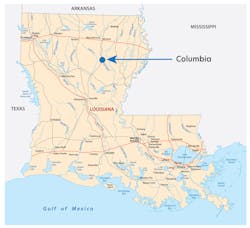Grassroots renewable fuels refinery planned for Louisiana
Strategic Biofuels LLC is developing a project for construction of a grassroots renewable fuels plant on a 171-acre site at the Port of Columbia in Caldwell Parish, La., about 25 miles south of Monroe.
To be operated by subsidiary Louisiana Green Fuels LLC (LGF), the proposed plant would use established refinery processes to produce up to 32 million gal/year of renewable fuel from a feedstock of wood waste made up of timber byproducts supplied by responsibly managed, sustainable plantation forests within the state, Strategic Biofuels and the Louisiana Economic Development (LED) said.
With geology of the planned development site already extensively studied and reviewed by both the US Environmental Agency and the Louisiana Department of Natural Resources as fit to permanently sequester carbon dioxide safely and securely, the proposed project also would feature carbon capture and storage (CCS), or sequestration, which—combined with its sustainably sourced feedstock—would enable LGF’s plant to produce renewable diesel in a carbon-negative fashion, according to LED and Louisiana Gov. John Bel Edwards.
“[In other words, this] means that [LGF’s] refinery would achieve better than net-zero emissions—it would actually remove more carbon from the environment than it produces,” Edwards said, citing the LGF project as an example of how Louisiana can merge traditional and emerging forms of energy to address climate change.
Strategic Biofuels already has engaged Justiss Oil Co. Inc. of Jena, La., to drill a sequestration test well at the proposed development site to confirm integrity of carbon storage a mile beneath the earth’s surface, Edwards confirmed.
Strategic Biofuels, which has received a $200-million tax-free bond allocation from the state of Louisiana to help advance the estimated $700-million project, is currently completing feasibility and financing phases, according to LED.
With 85% of its early stage financing presently secured from investors in North Louisiana, Strategic Biofuels said it expects to reach final investment decision (FID) on the project by yearend 2022.
Following FID, LED said the state of Louisiana would negotiate a competitive incentive package to secure the project, after which construction on the refinery would begin.
Based on a current 30-month construction phase, the proposed renewables refinery could be operational as soon as late 2024 or early 2025.
If approved, LGF’s refinery would produce about 83% renewable diesel and 17% renewable naphtha chemically identical to fossil-derived diesel and naphtha.
Unlike biodiesel—which is severely limited in how much can be blended into petroleum-derived diesel—LGF’s diesel as well as its naphtha production have no blending limitations and can be used directly as high-performance, low-emissions drop-in transportation fuels for vehicle tanks, Strategic Biofuels said on its website.
Alongside the LGF’s Port of Columbia renewables plant, Strategic Biofuels also is considering developing additional renewables-based refineries in Louisiana that would target production of both renewable diesel and aviation fuels, according to LED.
Feedstock details
Proposed location of the LGF plant comes as part of Strategic Biofuels goal to ensure long-term, cost-friendly feedstock supplies, as located within a 75-mile radius of plant’s site private landowners—mostly managed plantations—grow 40% more tons of pine annually than are harvested.
To prevent ruining further economic development, these managed forests must be thinned periodically to ensure remaining trees can grow quickly and to the size needed to harvest for lumber. These thinnings, along with branches, pine needles, and treetops—known as slash—will be the forestry wastes used as feedstock for the LGF plant, the company said.
About the Author
Robert Brelsford
Downstream Editor
Robert Brelsford joined Oil & Gas Journal in October 2013 as downstream technology editor after 8 years as a crude oil price and news reporter on spot crude transactions at the US Gulf Coast, West Coast, Canadian, and Latin American markets. He holds a BA (2000) in English from Rice University and an MS (2003) in education and social policy from Northwestern University.

